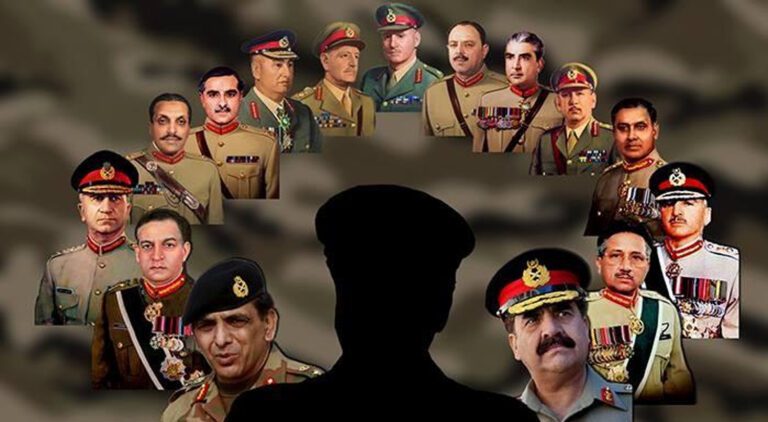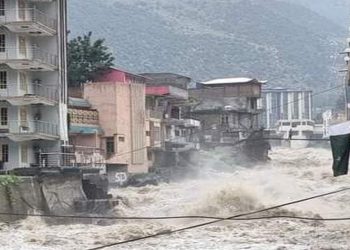General (retd) KM Arif had been a close associate of General Zia-ul-Haq, he was his Chief of Staff for many years, and later held the duties of Vice Chief of Army Staff. General Arif wrote a very rich and interesting book named “Working with Zia-ul-Haq” on his days spent with Zia-ul-Haq.
In this book, General KM Arif has made an interesting revelation regarding the process of making General Zia-ul-Haq the Army Chief by Zulfikar Ali Bhutto. It should be remembered that Bhutto made General Zia-ul-Haq the Army Chief instead of the top or first three generals in the seniority list, who was number eight in terms of seniority. Bhutto probably believed that by making a weak person of his choice, the military establishment would remain under his control. What happened later is a part of history and we all know it very well today.
Well, back to General Khalid Mahmood Arif’s book. General Arif wrote: “On January 29, 1976, General Tikka Khan retired from the army and Lt. Gen. Zia-ul-Haq was made the Army Chief in his place. General Zia superseded some generals who were senior to him for this position.
“From mid-1975, Mr. Bhutto began scouting for General Tikka Khan’s successor. At one stage, Bhutto even thought of giving Tikka Khan a one-year extension but later dropped the idea as it would not be advisable to do so. In the same days, Chief of Army Staff Tikka Khan’s address to the officers in a couple of garrisons also did not prove to be very promising in their favor.
“The seniority list was like this, General Sharif, General Akbar Khan, General Aftab, General Azmat Bakhsh Awan, General Agha Ali Ibrahim, General Malik Abdul Majeed, General Ghulam Jilani Khan and General Zia-ul-Haq.
“These eight generals were known by Bhutto personally, he investigated all the information, reputation and attributes of these officers through various intelligence agencies, special branches and such institutions, which are public and armed. He was responsible for keeping an eye on the forces. He also mentioned these names in meetings with various intelligence chiefs. Bhutto also consulted his kitchen cabinet, which included Maulana Kausar Niazi, Major General Imtiaz Ali (Military Secretary) and Lt Col Mukhtar Ahmad. Mukhtar belonged to the Intelligence Bureau and was also known as “Bhutto Boy”, he was kept in this Bureau to keep an eye on.
When Tikka Khan learned of his retirement, he wrote to Bhutto recommending General Akbar Khan as his successor. General Akbar was DG ISI in the past. Under normal circumstances incumbent refrains from naming his successor, unless specifically asked to do so. To imagine that the competent authority will act on this uninvited recommendation falls into the category of naivete. Bhutto rejected General Tikka’s recommendation as if to make him realize that this kind of meddling has no value.
“After doing his homework in a certain way, Bhutto called General Jilani (ISI) and Brigadier Muzaffar Malik (National Security Council) together in October, and November 1975. Bhutto made indecent remarks about all potential candidates in this meeting. The former prime minister finally said that General Sharif was Field Marshal (Ayub Khan)’s man. Then, after some hesitation, Bhutto said that when the government approved the post of Chief of Army Staff, then he would consider appointing Sharif as the Chairman of the Joint Chiefs of Staff Committee.
He then discussed Tikka Khan’s successor and sought feedback. Jilani advised them that it is not appropriate to ignore the meritorious ones wholesale. It is appropriate that they choose their choice from among the most senior general officers, all of whom are highly experienced and capable professional soldiers. Jilani said that if many senior officers are superseded (crossed) and take premature retirement, the structure of these military ranks will suffer.
Mr. Bhutto was not impressed by this logic and asked what do you think about Zia? General Jilani replied: I know him less personally than others, so it would not be appropriate to give an opinion. Bhutto then sought Muzaffar Malik’s opinion. Muzaffar’s reply was: You must know that there is a powerful germ of religion in his mind. Once this worm enters their head, it cannot be easily removed. Bhutto smiled at this but did not reveal his heart.
It appears that Bhutto started to trust Zia from the time he came in contact with him during the 1973 conspiracy case. Jilani believes that since Zia had punished the officers involved in the case who sought to overthrow the Bhutto government, Bhutto was personally grateful to Zia. During this period, Zia reported almost daily to Bhutto either directly or through Military Secretary Imtiaz. Immediately after the trial, Zia, as Colonel Commandant of the Armored Corps, requested Bhutto to accept the honorary post of Colonel-in-Chief of the Armored Corps.
“When Zia was the corps commander in Multan, he kept in constant contact with Mr. Bhutto and whenever Bhutto came to Multan, Zia would definitely meet him. Once Bhutto visited the Multan Garrison, a large number of women and children in the Multan Cantonment welcomed the distinguished guest and showered with flower petals. This performance of Zia won the heart of Bhutto.
Bhutto eventually replaced General Tikka Khan with Zia as the Chief of the Army Staff and General Sharif was made the Chairman of the Joint Chiefs of Staff Committee. Before announcing his promotion, Bhutto also called General Zia for a meeting. “
(General KM Arif in his book also mentioned in detail the events due to which General Zia-ul-Haq, who was in need of Bhutto, overthrew Bhutto on July 5, 1977, and arrested Bhutto. Later, in the same government Because of this, Bhutto was sentenced to death in a court case. But this is not our topic today.)
It is said that the greatest lesson of history is that no one learns from it.
In Pakistan, the post of Army Chief is considered very powerful in many countries of the world, but perhaps in no other country is this appointment made so much noise, so many conspiracy theories, guesses, and assumptions are made. Unfortunately, our civilian rulers have rarely handled this issue gracefully.
The best way is while making this appointment, instead of political interests or personal connection, only professional merit and the interest of the country and nation should be put forward. The best appointment on merit not only solves the problem quickly but also gets acceptance from all sides.
It is also a coincidence that Mian Nawaz Sharif got the opportunity to appoint the most in Pakistani history, the most controversies also arose during his period. Unfortunately, it is said about Mian Nawaz Sharif that he often of mishandling and put his own desires and goals first.
This time Mian Nawaz Sharif is out of the country, but his grip on the government is strong.
The privilege of appointment belongs to Mian Shehbaz Sharif, the Prime Minister of Pakistan, but the possibility is that the decision taken by Mian Nawaz Sharif will be implemented, even if there is a crisis, the system is threatened, or whatever the result is.
It is prayed that our rulers act with prudence, foresight and wisdom and do not confuse the country suffering from economic crises with any new problem. May the decision be the best for Pakistan, Ameen.

































